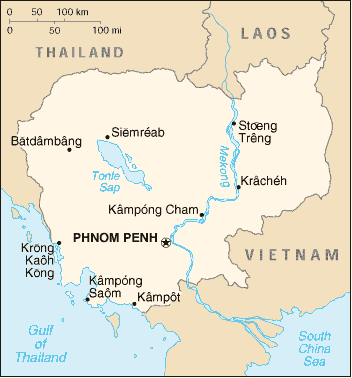Cambodia

The Kingdom of Cambodia, formerly known as Kampuchea, is a country in South East Asia with a population of over 14 million people. The kingdom's capital and largest city is Phnom Penh. Cambodia is the successor state of the once powerful Hindu and Buddhist Khmer Empire, which ruled most of the Indochinese peninsula between the 11th and 14th centuries.
A citizen of Cambodia is usually identified as "Cambodian" or "Khmer," though the latter strictly refers to ethnic Khmers. Most Cambodians are Theravada Buddhists of Khmer extraction, but the country also has a substantial number of predominantly Muslim Cham, as well as ethnic Chinese, Vietnamese and small animist hill tribes.
The country borders Thailand to its west and northwest, Laos to its northeast and Vietnam to its east and southeast. In the south it faces the Gulf of Thailand. The geography of Cambodia is dominated by the Mekong River and the Tonle Sap ("the fresh water lake"), an important source of fish.
Agriculture has long been the most important sector of the Cambodian economy, with around 59% of the population relying on agriculture for their livelihood (with rice the principal crop). Garments, tourism, and construction are also important. In 2007, foreign visitors to Angkor Wat numbered more than 4 million. In 2005, oil and natural gas deposits were found beneath Cambodia's territorial waters, and once commercial extraction begins in 2011, the oil revenues could profoundly affect Cambodia's economy. Observers fear much of the revenue could end up in the hands of the political elites if not monitored correctly.
2006 GDP was $7.265 billion (per capita GDP $513), with annual growth of 10.8%. Estimates for 2007 are for a GDP of $8.251 billion (per capita $571) and annual growth of 8.5%. Inflation for 2006 was 2.6%, and the current estimate for final 2007 inflation is 6.2%. Per capita income is rapidly increasing, but is low compared with other countries in the region. Most rural households depend on agriculture and its related sub-sectors. Rice, fish, timber, garments and rubber are Cambodia's major exports.
The civil war and its aftermath have had a marked effect on the Cambodian population. The median age is 20.6 years, with more than 50% of the population younger than 25. At 0.95 males/female, Cambodia has the most female-biased sex ratio in the Greater Mekong Subregion. In the Cambodian population over 65, the female to male ratio is 1.6:1. UNICEF has designated Cambodia the third most landmined country in the world, attributing over 60,000 civilian deaths and thousands more maimed or injured since 1970 to the unexploded land mines left behind in rural areas. The majority of the victims are children herding animals or playing in the fields. Adults that survive landmines often require amputation of one or more limbs and have to resort to begging for survival. In 2006, the number of landmine casualties in Cambodia took a sharp decrease of more than 50% compared to 2005, with the number of landmine victims down from 800 in 2005 to less than 400 in 2006. The reduced casualty rate continued in 2007, with 208 casualties (38 killed and 170 injured).
Cambodia's infant mortality rate has decreased from 115 in 1993 to 89.4 per 1000 live births in 1998. In the same period, the under-five mortality rate decreased from 181 to 115 per 1000 live births.In the province with worst health indicators, Ratanakiri, 22.9% of children die before the age of five.
